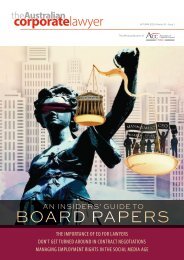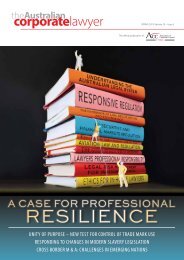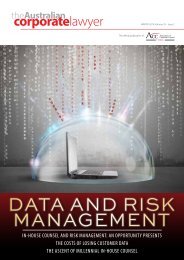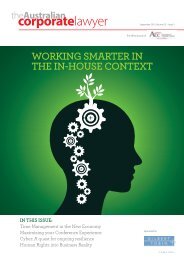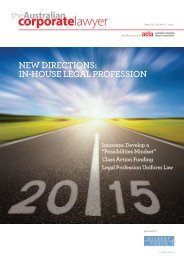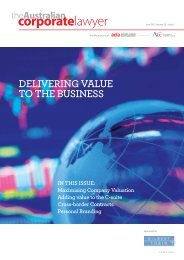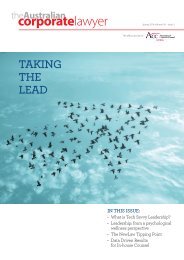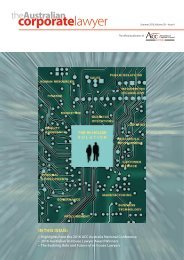Australian Corporate Lawyer - Autumn 2017
Australian Corporate Lawyer is the official publication of the Association of Corporate Counsel (ACC) Australia. The Autumn 2018 issue focuses on 'The Law and Technology' and features a range of articles covering topics including: the future of contracts and; the future of law firms as software companies..
Australian Corporate Lawyer is the official publication of the Association of Corporate Counsel (ACC) Australia. The Autumn 2018 issue focuses on 'The Law and Technology' and features a range of articles covering topics including: the future of contracts and; the future of law firms as software companies..
Create successful ePaper yourself
Turn your PDF publications into a flip-book with our unique Google optimized e-Paper software.
acla.acc.com<br />
of around 12 made up of business partners,<br />
in-house and external counsel had taken<br />
a time out for coffee. My team was made<br />
up of 6 persons – each of us of a different<br />
nationality: American, British, Canadian,<br />
Chinese, French and Singaporean. As we<br />
gathered for coffee, the opposing outside<br />
counsel was next to me. She made a remark<br />
about how diverse my team was and asked<br />
where I was from. We struck up a conversation<br />
sharing our background. I told her of how I<br />
had known of her product brand growing<br />
up in Asia. I told her how when I left home at<br />
16 to begin college in Singapore, my mother<br />
had bought me a little pink rice cooker. It was<br />
well used (especially by my dorm mates) and<br />
while I have lived in different places since<br />
college, my mother still had the rice cooker in<br />
our family home.<br />
My personal sidebar recollection of my<br />
first experience of her company’s brand<br />
was the unanticipated opportunity to<br />
connect emotionally and build trust. The<br />
brand currency in this commonplace article<br />
bridged a connection and paved the way<br />
for collaboration. From that point, we were<br />
comfortable enough to call each other on<br />
cell phones to express concerns; brainstorm<br />
solutions and ultimately play our part, along<br />
with the rest of the team, to shepherd the deal<br />
to a successful conclusion. And the relationship<br />
continues with calls from time to time as we<br />
manage the legalities of the license together.<br />
In conclusion, cultural intelligence – the<br />
ability to identify and interpret cultural<br />
signals – is a key element of the global<br />
mindset. And this cultural competence is a<br />
journey not a destination.”<br />
The Global Mindset®<br />
– a Comprehensive Guide<br />
to Global Leadership<br />
How can the global mindset be defined<br />
and measured objectively to help improve<br />
business performance? This question was the<br />
starting point of one of the most extensive<br />
studies in the international business field.<br />
This is how the “Global Mindset®” leadership<br />
model was identified by researchers at the<br />
Thunderbird School of Global Management.<br />
“This model is excellent because it covers<br />
all skills and attributes needed to succeed<br />
comprehensively.” says a global association<br />
executive. Leadership can be defined as<br />
the ability to demonstrate people, results,<br />
thought and personal leadership. Validation<br />
studies in 62 countries showed that the<br />
concept was positively correlated with all<br />
of these independent leadership<br />
performance indicators.<br />
The Global Mindset is a set of individual<br />
attributes that help leaders to better influence<br />
individuals, groups, organisations and systems<br />
unlike their own. The 36 Global Mindset®<br />
attributes were identified through extensive<br />
research with professionals and academicians.<br />
The attributes of this concept can be taught<br />
in organizations through assessment, training<br />
and coaching, and comprises three key areas:<br />
(1) The Intellectual Capital is our capacity<br />
to understand how our business might<br />
work on a global level. The key attributes<br />
related to this area are “global business<br />
savvy” which is about our understanding<br />
of our customers, competitors and risk<br />
at international/regional/global level,<br />
“cognitive complexity” which is our<br />
ability to analyze and problem-solve<br />
and “cosmopolitan outlook” which is our<br />
knowledge of different cultures, history,<br />
geography, political and economic<br />
systems around the world.<br />
(2) The Psychological Capital relates to<br />
our receptiveness to new ideas and<br />
experiences. The key attributes are<br />
“passion for diversity” which is about<br />
intense curiosity about other parts<br />
of the world, experiencing different<br />
cultures and trying new ways of doing<br />
things, “thirst for adventure” which is<br />
about an appreciation for and an ability<br />
to thrive in unpredictable, complex<br />
environments and “self-assurance” which<br />
is self-confidence, a sense of humor,<br />
willingness to take risks in new contexts<br />
also requiring high levels of energy.<br />
(3) The Social Capital relates to our ability<br />
to build trusting relationships with<br />
people who are different from us. The<br />
key attributes are “empathy” which is<br />
our ability to emotionally connect with<br />
people from other parts of the world,<br />
“interpersonal impact” which is about<br />
being able to bring diverse perspectives<br />
together, maintain credibility and<br />
develop networks in unique ways,<br />
and “diplomacy” which is about our<br />
ability to listen to what is said and not<br />
said in conversations, our ability to<br />
start conversations with strangers<br />
and an inclination to ask rather than<br />
answer questions.<br />
The Global Mindset® levels can be assessed<br />
with the Global Mindset Inventory® (GMI), an<br />
online survey tool. Professionals can identify<br />
their strengths, capitalise on these and then<br />
help others develop themselves in these areas.<br />
They then can focus on their development<br />
areas as well and come up with strategies to<br />
improve these.<br />
Recommendations:<br />
• Define your leadership value as<br />
in-house counsel early internally within<br />
your organisation.<br />
• Utilise Global Mindset skills not only to<br />
succeed internationally or externally<br />
but also to build relations and results<br />
internally across internal sub-cultures,<br />
teams and departments.<br />
• Consider helping form a “risk and trust<br />
committee” that tracks potential risk<br />
situations as well as opportunities in foreign<br />
markets. This may be critical for building<br />
credibility early on and responding to crisis<br />
as market conditions can change quickly.<br />
• Consider initiating a global organisational<br />
culture campaign that communicates<br />
key organisational values. Utilise various<br />
channels of communication to gauge how<br />
well it is understood and receive feedback<br />
being prepared to learn and change.<br />
• Communicate by engaging to ensure<br />
you are being understood (if necessary<br />
via intermediary individuals) and to<br />
receive feedback.<br />
• Remember that trust can be built in<br />
different ways across cultures. Reflect on<br />
how you can relate to others at a personal<br />
level in addition to through a written/<br />
formal agreement.<br />
• Build your networks to understand and<br />
navigate legal landscapes and relations.<br />
Consider relationships long-term. A<br />
relationship may prove to be very valuable<br />
at an unprecedented time. This mentality<br />
also means that each relationship can be a<br />
conduit to many other relationships rather<br />
than the border to other relationships as in<br />
other cultures.<br />
• Invest time and resources in significant<br />
research to understand goals, market<br />
conditions and emotions prior to<br />
international negotiations or any type<br />
of conflict.<br />
• Understand the role of social media and<br />
the way public awareness is built in foreign<br />
markets to pre-empt crisis situations and<br />
possibly deploy information to build<br />
public trust.<br />
• Integrate global mindset insights into your<br />
brand and all your communications.<br />
• Be prepared and practiced for when<br />
to walk away from your negotiations<br />
while continuing to respect and maintain<br />
the relationship.<br />
• Consider diversifying your team and<br />
raising its Global Mindset® levels by hiring<br />
professionals from different cultures<br />
and with different language capabilities.<br />
Ensure they have the opportunity to learn<br />
to work effectively together. Importantly<br />
seek to develop confidence in leading a<br />
multicultural team as research suggests<br />
that multicultural teams can underperform<br />
if not led with a global mindset.<br />
VOLUME 27, ISSUE 1 – AUTUMN <strong>2017</strong><br />
29



